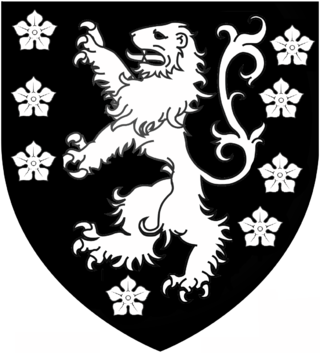Related Research Articles
Sir Henry Herbert was Master of the Revels to both King Charles I and King Charles II, as well as a politician during both reigns.
Richard Salwey was an English politician who sat in the House of Commons variously between 1645 and 1659. He was a republican in politics and fought on the Parliamentary side in the English Civil War.

Sir Gervase Clifton, 1st Baronet, K.B. was an English politician who sat in the House of Commons at various times between 1614 and 1666. He supported the Royalist cause in the English Civil War. He was educated at St John's College, Cambridge.
Sir William Russell, 1st Baronet, of Wytley, was an English politician who sat in the House of Commons in 1625. He was an officer in the Royalist army during the English Civil War and, as Governor of Worcester, he refused entry to the Parliamentary cavalry shortly before the Battle of Powick Bridge — the first cavalry skirmish of the Civil War.
Cresheld Draper was an English politician who sat in the House of Commons from 1678 to 1689.
Humphrey Salwey (1575–1652) was an English politician who sat in the House of Commons from 1640 to 1652. He supported the Parliamentary side in the English Civil War.
Richard Cresheld was an English judge and politician who sat in the House of Commons variously between 1624 and 1648.
John Barker was an English draper and politician who sat in the House of Commons between 1640 and 1653. He supported the Parliamentary side in the English Civil War.
Sir Thomas Rouse, 1st Baronet was an English politician who sat in the House of Commons variously between 1654 and 1660 and supported the Parliamentary cause during the English Civil War.
Baron Sir Thomas Street, MP, KB, JP was an English judge and politician who became a Baron of the Exchequer in 1681. He represented Worcester in the House of Commons between 1659 and 1679. In 1667, he became the Mayor of Worcester, as his father had been before him. In 1677, he became the Chief Justice of Brecknock, Glamorgan and Radnor.

Sir Ralph Knight was an English soldier and politician who sat in the House of Commons in 1660. He served in the Parliamentary army in the English Civil War. He sold 'the Barrels' Manor House in Ullenhal Worcestershire to his cousin to join Cromwell. The Manor had been in the family since the early 1500s.
Edward Pytts was an English politician who sat in the House of Commons at various times between 1654 and 1660.

Sir John Carter was an English soldier, politician and administrator from Buckinghamshire, who served in the Parliamentarian army during the Wars of the Three Kingdoms. He settled in Denbighshire and was a Member of Parliament at various times between 1654 and 1660.
Sir Robert Harley FRS was an English politician who sat in the House of Commons from 1647 to 1648 and in 1660.
Sir Ralph Clare (1589–1670) was an English courtier and politician who sat in the House of Commons at various times between 1614 and 1628.
Theophilus Andrews was an English lawyer and politician who sat in the House of Commons in 1659.
William Collins was an English politician who sat in the House of Commons from 1654 to 1659. He supported the Parliamentary cause in the English Civil War.
John Bridges was an English politician who sat in the House of Commons in 1654 and 1656. He fought in the Parliamentarian army in the English Civil War.

Sir Rowland Cotton was an English politician who sat in the House of Commons at various times between 1605 and 1629.
John Nanfan was a 17th-century English politician, elected MP for Worcestershire in 1656.